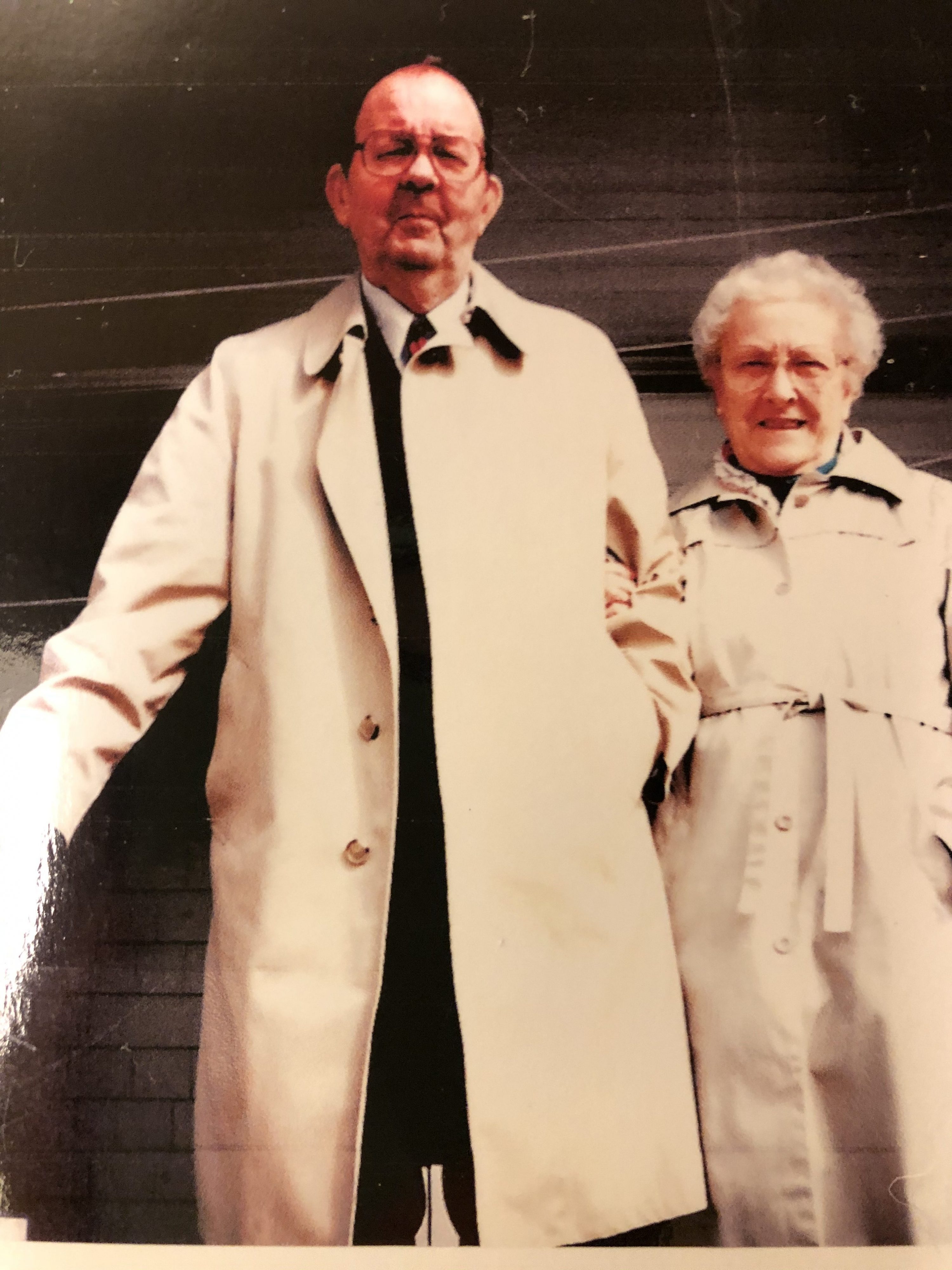About a year into college my grandfather passed away. My grandparents had just celebrated sixty years together at the local nursing home Pepe had been living in for the last six months, and I wasn’t there for the party. Each one of their children and grandchildren were present except for me, and it’s the great shame of my life that the one thing my grandmother asked me to do for her in all the time she loved me was something I told her I couldn’t.
You see, I had to visit my boyfriend. He lived in New York and I lived in Maine and our young relationship of three or four months (at most) couldn’t go another week (we’d already survived two) without a reunion. Instead, I swung by her tiny apartment in her retirement community, and I made her unwrap an anniversary present, a hastily wrapped picture I’d found of my grandparents sitting on my aunt’s porch that I’d slid into one of those chintzy wooden picture frames you find at craft stores specializing in discount homeware.
She looked at it and back at me and said, “Thank you,” and that was it. No lecture. No anger. No, “How could you miss out on this moment while we’re losing your grandfather everyday?”
Just “Thank you.”
I said I felt awful, yada yada yada, and she told me to be careful and make sure I had enough gas in my car, to bring clothes and wear shoes and all of the things I seemed to surprisingly forget to travel with as a nineteen-year-old college student.
To be fair, this was nothing new for Meme, these instructions on how to live, how to be a good, big girl and take care of myself so my poor mother didn’t have to go around and pick up after me all the time and wash all the dirty clothes I’d crammed under my bed or in my closet, to put away the “trail of Em-ly” I’d left all over the house (bookbags, coats, shoes, food wrappers, dishes, what have you; these were all part of the trail).
Meme had been telling me what to do and how to do it so others wouldn’t have to my whole blessed life.
When I got my first job working as a cashier at the local grocery store, Meme was often the one who would pick me up after school and bring me down to the market (even though it was only a five minute walk from my front doorstep). Frequently, she’d take me to the bank to deposit my checks, drop in after school, leave a pot of chop suey on the stove, and tell me not to to eat it until my mother got home.
I always ate it.
Even after I miraculously got my license and became a college student, Meme would come by to help me pack and make sure I had everything I needed all ready to go. I remember intentionally waiting to pack until she came over, purposefully saving my laundry until she arrived so I could hear her say, “Oh, Em-ly, what would you ever do without me? You know this world doesn’t run on love, little girl! You’ve gotta start doin’ these things for yourself. Your poor mother isn’t always goin’ to be around to do all of this for you.”
It got to be our thing, my needing her but not really needing her, her telling me what I needed to do and how I needed to do it. I looked forward to the scoldings and the slaps on the wrist and always that cackle of hers, her laughter when she was done reading me the riot act.
“What am I goin’ to do with you?” she’d say as her eyes gleamed from behind her glasses.
After Pepe died, the fall of my second year at school, I tried to spend more time over at Meme’s apartment when I was home. Hers was the very first place I’d stop on my way into town. I needed to see her first, to surprise her and hug her and give her a kiss on the cheek that she’d never ask for but always loved.
You had to court my grandmother, you really did. She was one of those women who needed charming and a lot of it, not because she was vain or narcissistic or anything like that. She was the opposite — she never knew how special or important she was, and that’s why I worked so hard to make her feel it, to make her know how much she meant to me.
She’d write me one letter, sometimes two, every week that I was away. I hope I wrote her back with the same consistency. She’d talk about the weather, what she’d did that day, who’d she seen or been out to lunch with, what doctors appointments she had been to and had coming up, and I’d answer with my usual drivel: school, boys, friends, my nose ring, haircut, tanning, bell bottom pants crises.
While I was back at home and my folks watched the news at night, I’d head over to Meme’s to keep her company. She’d make me a glass of chocolate milk, give me a cookie or a turnover or some such sugary carbohydrate, and we’d settle into watch “Everybody Loves Raymond” or the Red Sox or the “Wheel of Fortune.”
“The whole show is rigged,” she’d say. Meme never did trust Pat Sajak. Something about that smarmy smile of his when a contestant on the verge of winning landed on the bankrupt wedge rubbed her the wrong way.
On one of these nightly visits I remember wanting to talk to her about Pepe, about how she was doing since he’d been gone. I mean, they’d spent sixty years together and now here she was, alone in her cramped apartment watching daytime soap operas (her “stories” she called them) and nighttime television around the clock. Wasn’t it hard without him?
“Em-ly, you can’t live in the past. What good does it do to go back?”
I don’t think I had any words for her then. I shut my mouth and asked if she wanted to watch another episode of “Everybody Loves Raymond” and let that be that. Later, when I continued to visit Meme, I learned to stick to things she was doing now, so I asked her about her line dancing class, about “Meals for Me” and what they were serving up this week, about lunch out with Phyllis and Althea and did they like that new place in Newport, about whether or not she got her hair “set” on Friday and how was the curl holding up?
In short, I asked her about life.
Meme lived a few years past Pepe and during that time she drove a car, went to church, did all her own grocery shopping, took her friends out, bought and wrapped all her Christmas presents months ahead of Jesus’s birth, and continued to be the matriarch of our large, French Canadian Catholic family.
Right before Christmas break of my senior year, ironically on a weekend I had wanted to come home, I got the call that she had passed away in her sleep. I had spoken to her two days before when I had phoned her to say I was thinking about visiting.
She told me to save my gas. “There’s no use in you coming all this way for one day,” she said. “Save your money. You know, cars don’t run on love, Em-ly.”
I told her I loved her, and if she wanted me to stay put then she knew best. Didn’t she always?
It’s been twenty years since my grandmother died and there are some days I don’t remember this, when I’m so caught up in raising my own children, calling my parents, teaching kids, writing stories, grading papers, running my ass off, doing weird muscle stretches in my living room, that I forget to remember I miss her.
But a couple of decades of mourning has taught me something the moments with her didn’t. Meme was right and she was wrong about two things.
As to what she was wrong about, it’s taken me at least one of those decades to learn. While cars don’t run on love and certainly everything costs money, I think the world does run on love. At the risk of sounding all Barbra Streisand, “People, people who need people are the luckiest people in the world,” I think Babs was onto something.
We do need each other.
During the darkest, happiest, hardest, best times in my life, I’ve been buoyed up by the ones I love and the ones who love me. I’ve always endeavored to do the same for them. Why?
Because love saves us. It heals us and changes us and makes us all want to be better humans. What could be more empowering than that? Somehow, I think Meme always knew this, even when she said the opposite. Her fierce devotion to people demonstrated her belief in the power of love every single minute of her life.
Now, what was Meme right about? I think it’s something we all need to hear now more than ever.
We can’t live in the past. Going back to yesterday, reliving, rehashing, reimagining how great the times are that have gone by, this doesn’t allow us to live in the present. It only keeps us stuck in nostalgia and blocks ourselves from moving forward.
Meme missed Pepe everyday of her life. She spoke for him when he got older. She helped him put his watch on, get into and out of his recliner, and served him three meals a day on a tv tray. She helped get him up and put him to bed and did all of the things that came in between. How could she not miss someone who she spent her whole life loving?
She missed Pepe, but she decided to love herself and her new life as much as she missed him. Meme decided she couldn’t lay down and die because there was more life to be lived, her life. And she lived it.
For all of the times she threw my stuff in a trash bag, hangers and all, for all of the ways she made me get my act together, what I am most grateful for as a forty-one-year old wife and mother is the spirit of a woman who taught me what life and love are all about.
Choosing to continue to do both.


